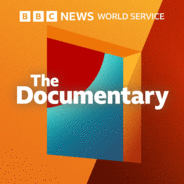We take a look at some of the more unusual sports practiced on the African continent. Kelvin Kimathi recently travelled to Uganda where a muddy version of entertainment wrestling is becoming increasingly popular. Marcia Veiga discovered Capoeira Angola whilst finding a way to connect with her own Angolan heritage. Eshlin Vedan met the only black teenager in South Africa competing in tent pegging- a cavalry sport of ancient origin.Nitin Sultane reports for BBC Marathi and recently travelled to a village in Maharashtra where discarded fabric has been turned into paper for 700 years.This episode of The Documentary comes to you from The Fifth Floor, the show at the heart of global storytelling, with BBC journalists from all around the world. This is an EcoAudio certified production.(Photo: Faranak Amidi. Credit: Tricia Yourkevich.)

FeatureKultur & Gesellschaft
The Documentary Podcast Folgen
Hear the voices at the heart of global stories. Where curious minds can uncover hidden truths and make sense of the world. The best of documentary storytelling from the BBC World Service. From China’s state-backed overseas spending, to on the road with Canada’s Sikh truckers, to the front line of the climate emergency, we go beyond the headlines. Each week we dive into the minds of the world’s most creative people, take personal journeys into spirituality and connect people from across the globe to share how news stories are shaping their lives.
Folgen von The Documentary Podcast
2000 Folgen
-
Folge vom 23.08.2025Mud wrestling and tent pegging: Africa’s unusual sports
-
Folge vom 23.08.2025Ukrainians at war and their hopes for peaceWhile US President Donald Trump spearheads efforts to halt the conflict in Ukraine, Russian drones and missiles continue to kill and injure civilians, invaders control around a fifth of the country, and many Ukrainians fear that any peace agreement could result in a permanent loss of territory. Away from the international diplomacy, we wanted to give a sense of how life has changed in Ukraine over the past three and a half years of war. We bring together three soldiers who share their experiences of the frontline. We also hear from Ukrainians forced to leave the country and bring together three women dealing with the trauma of the conflict. Sasha tells us. “Everybody has lost someone or something – be it a home, friend or someone from their closest family.” This episode of The Documentary, comes to you from BBC OS Conversations, bringing together people from around the world to discuss how major news stories are affecting their lives.
-
Folge vom 22.08.2025Gaudí: God’s architectIn one of his final official acts before he died, Pope Francis put Antoni Gaudí, Spain’s most famous architect, onto the path to sainthood. Gaudí's masterpiece, the Sagrada Familia, is a towering basilica, strangely designed and bursting with colour. It stands in the heart of Barcelona and its walls recount the entire story of the Catholic religion. After 140 years, having survived wars, arson attacks and dictatorship, it is still under construction. As Gaudí worked on it throughout his life, he became obsessive and it intensified his devotion. By the end of his life he was living like a monk. The BBC's Max Horberry has been to Barcelona to see Gaudí's work and speak to the people who have been working to finish the Sagrada Familia and campaigning for Gaudí's sainthood. He finds out more about the path to sainthood and how architecture, nature and religion intertwine in Gaudí’s life. This episode of The Documentary, comes to you from Heart and Soul, exploring personal approaches to spirituality from around the world.
-
Folge vom 21.08.2025White Coats v the White HouseScience journalist Roland Pease asks whether the rounds of cuts, reorganisations and political strong-arming in US science can be weathered, and how they will likely affect us all. Eighty years ago Vannevar Bush proposed what became the pact between government and universities that led to decades of global scientific dominance. Today, US scientists fear the Trump administration is ripping up that agreement, mandating what and what can’t be studied, who can study it, and redefining expertise. The specialist agencies are either being closed down or defunded to the extent that tens of thousands of government scientists are already unemployed. Multi-year experiments are being closed down uncompleted. Top universities are besieged by mandates on who and how they hire, tied to their future funding. Data streams that benefit researchers around the globe are being switched off. Even definitions of what counts as evidence are being redrafted. Can the administration's declared aim of "restoring gold standard science", be achieved?
